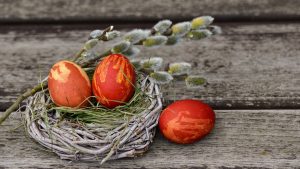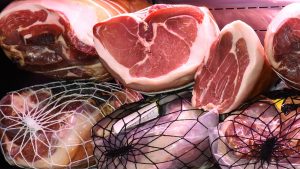Ham and painted eggs everywhere- Easter in Hungary
Easter is one of the most important events in the Christian calendar after Christmas. It is celebrated in many different ways all around the world. There are few things in common everywhere, like the eggs, chocolates or the world famous Easter bunnies. Many stories, tales and films focus on this topic, so I am absolutely sure that non-Cristian people have also heard or know of this festive season. As I am not really convinced that foreign students know much about the Hungarian Easter traditions, so I would like to describe it to you this time.

Originally, Easter follows the fasting period and it celebrates the event of Jesus rising from the dead. However, it became a very colourful festive period in Hungary as our Easter traditions have links to Cristian habits, pagan rituals and modern fashion at the same time. In addition, as this holiday is right after the Lenten fasting period, food has a very important role in this part of the year. The majority of the Hungarian families plan the menu carefully long before Easter. Fish and other meat dishes are served; other typical Hungarian dishes likeham with horseradish and boiled eggs also appear on the table. Cakes and other pastries are also crucial part of the festive board, the so called “kalács” or scone which is a kind of a braided yeast bread cannot be absent from the table. As a modern part of Easter, chocolate eggs also appeared in Hungary in the last few decades. Usually, on Easter Sunday or rather Monday, “Easter Bunny” hides some chocolate eggs and other kind of candies in the gardens or backyards and children look for them during an exciting and funny Easter Egg Hunt. By the way, Easter rabbit does not have a very long tradition in Hungary either, it only appeared here in the 20th century. The bunny has German origins and its first mention can be dated back to the 17th century.
There is another hilarious tradition on Easter Monday worth to mention; it is mainly for older children and young adults. The so called “locsolkodás” or sprinkling involves boys and men saying a piece of special Easter poetry to girls and women in which they are asking for permission to sprinkle them. Nowadays, this sprinkling is done mainly with perfume or scented water but every now and then a bucket of very cold water substitutes the perfume. Originally, the target of this action were only young non-married women, but nowadays female relatives, friends and colleagues can be sprinkled by those men who keep this funny tradition.To compensate the sprinkling, ladies give painted Easter eggs, chocolate, cookies or pálinka to the men.

Homemade decorated eggs play also an important part of this festive season. Originally, eggs were painted red as it symbolizes Jesus’ blood but in the last few centuries it changed. Eggs became as colourful as possible and different kind of motives appeared on them, too. As a reflection of the Hungarian folk heritage, flower motives became more and more popular. However, there are many different ways to create homemade painted eggs. Girls and women still keep this tradition alive in the majority of the Hungarian households. Before starting to decorate the eggs, their content is often blown out to conserve the yolk for the future but boiled eggs can also be used. A unique technique to decorate is to use wax to draw on the eggs that will be melt off during the dying and leave white pattern of the coloured egg shell. Other natural elements like onion skins, turmeric, beet or red cabbage can also be applied to colour eggs. You can find a lot of description and videos on the internet if you feel like surprising your friends with special, home maid painted eggs. And if you would like to greet your Hungarian friends and say Happy Easter to tem you should say “kellemes húsvéti ünnepeket” (cal-am-ash hoosh-veh-tee oon-nap-ak-at).

The whole Easter season is public holiday in Hungary, so be aware that the shops are closed on Good Friday, Easter Sunday and Monday. Fortunately, cafés, restaurants and some convenience stores are open during these days and of course festivals are organised all over the country that are also worth to visit.
Source: welovebudapest.com
Fotók: pixabay.com
